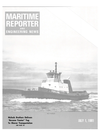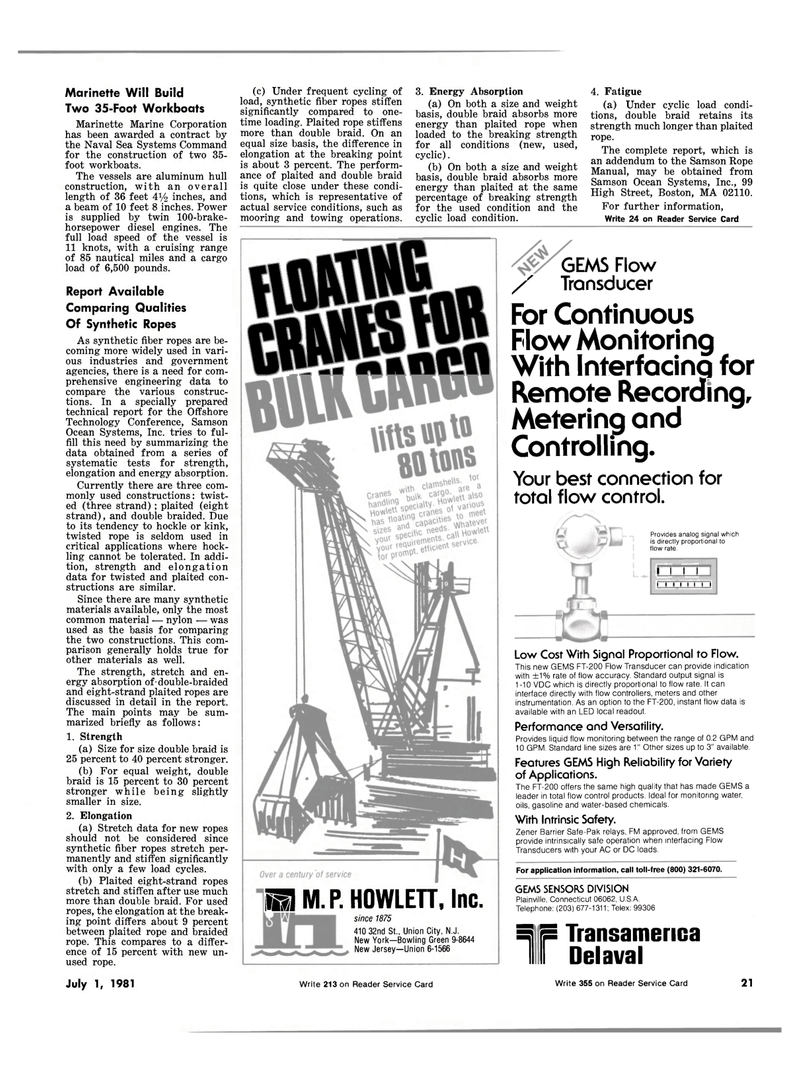
Page 19: of Maritime Reporter Magazine (July 1981)
Read this page in Pdf, Flash or Html5 edition of July 1981 Maritime Reporter Magazine
Marinette Will Build
Two 35-Foot Workboats
Marinette Marine Corporation has been awarded a contract by the Naval Sea Systems Command for the construction of two 35- foot workboats.
The vessels are aluminum hull construction, with an overall length of 36 feet 4y2 inches, and a beam of 10 feet 8 inches. Power is supplied by twin 100-brake- horsepower diesel engines. The full load speed of the vessel is 11 knots, with a cruising range of 85 nautical miles and a cargo load of 6,500 pounds.
Report Available
Comparing Qualities
Of Synthetic Ropes
As synthetic fiber ropes are be- coming more widely used in vari- ous industries and government agencies, there is a need for com- prehensive engineering data to compare the various construc- tions. In a specially prepared technical report for the Offshore
Technology Conference, Samson
Ocean Systems, Inc. tries to ful- fill this need by summarizing the data obtained from a series of systematic tests for strength, elongation and energy absorption.
Currently there are three com- monly used constructions: twist- ed (three strand) ; plaited (eight strand), and double braided. Due to its tendency to hockle or kink, twisted rope is seldom used in critical applications where hock- ling cannot be tolerated. In addi- tion, strength and elongation data for twisted and plaited con- structions are similar.
Since there are many synthetic materials available, only the most common material — nylon — was used as the basis for comparing the two constructions. This com- parison generally holds true for other materials as well.
The strength, stretch and en- ergy absorption of-double-braided and eight-strand plaited ropes are discussed in detail in the report.
The main points may be sum- marized briefly as follows: 1. Strength (a) Size for size double braid is 25 percent to 40 percent stronger. (b) For equal weight, double braid is 15 percent to 30 percent stronger while being slightly smaller in size. 2. Elongation (a) Stretch data for new ropes should not be considered since synthetic fiber ropes stretch per- manently and stiffen significantly with only a few load cycles. (b) Plaited eight-strand ropes stretch and stiffen after use much more than double braid. For used ropes, the elongation at the break- ing point differs about 9 percent between plaited rope and braided rope. This compares to a differ- ence of 15 percent with new un- used rope.
July 1, 1981 (c) Under frequent cycling of load, synthetic fiber ropes stiffen significantly compared to one- time loading. Plaited rope stiffens more than double braid. On an equal size basis, the difference in elongation at the breaking point is about 3 percent. The perform- ance of plaited and double braid is quite close under these condi- tions, which is representative of actual service conditions, such as mooring and towing operations. 3. Energy Absorption (a) On both a size and weight basis, double braid absorbs more energy than plaited rope when loaded to the breaking strength for all conditions (new, used, cyclic). (b) On both a size and weight basis, double braid absorbs more energy than plaited at the same percentage of breaking strength for the used condition and the cyclic load condition. 4. Fatigue (a) Under cyclic load condi- tions, double braid retains its strength much longer than plaited rope.
The complete report, which is an addendum to the Samson Rope
Manual, may be obtained from
Samson Ocean Systems, Inc., 99
High Street, Boston, MA 02110.
For further information,
Write 24 on Reader Service Card
SSfe
M M. P. HOWLETT, Inc. since 1875 410 32nd St., Union City, N.J.
New York—Bowling Green 9-8644
New Jersey—Union 6-1566
GEMS Flow / Transducer
For Continuous Flow Monitoring
With Interfacing for Remote Recording,
Metering and Controlling.
Your best connection for total flow control.
Provides analog signal which is directly proportional to flow rate.
MM i i 11 M i i
Low Cost With Signal Proportional to Flow.
This new GEMS FT-200 Flow Transducer can provide indication with ±1% rate of flow accuracy. Standard output signal is 1-10 VDC which is directly proportional to flow rate. It can interface directly with flow controllers, meters and other instrumentation. As an option to the FT-200, instant flow data is available with an LED local readout.
Performance and Versatility.
Provides liquid flow monitoring between the range of 0.2 GPM and 10 GPM. Standard line sizes are 1" Other sizes up to 3" available.
Features GEMS High Reliability for Variety of Applications.
The FT-200 offers the same high quality that has made GEMS a leader in total flow control products. Ideal for monitoring water, oils, gasoline and water-based chemicals.
With Intrinsic Safety.
Zener Barrier Safe-Pak relays, FM approved, from GEMS provide intrinsically safe operation when interfacing Flow
Transducers with your AC or DC loads.
For application information, call toll-free (800) 321-6070.
GEMS SENSORS DIVISION
Plainville, Connecticut 06062, U.S.A.
Telephone: (203) 677-1311; Telex: 99306
T Transamerica Delaval
Write 213 on Reader Service Card Write 355 on Reader Service Card 21

 18
18

 20
20
